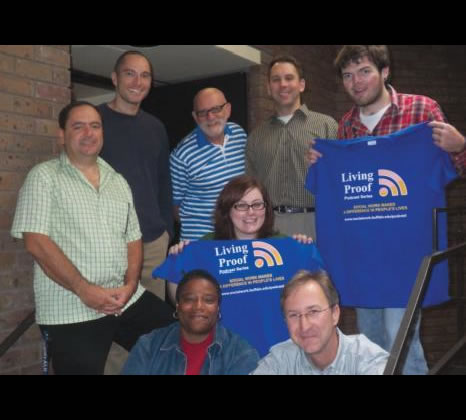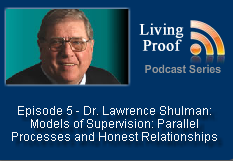Podcasts Prove Social Workers Not All Thumbs When it Comes to Technology

The "Living Proof" podcast team. Back row from left: Dave Coppola, Howard Doueck, Steve Sturman and Josh Bradley. Middle row: Richard Amantia and Kathryn Clark. Front row: Adjoa Robinson and Peter Sobota.
Staff from the University at Buffalo School of Social Work staff is disproving the myth that social workers are technologically challenged.
The school has launched a “Living Proof” podcast series that uses technology to spread social work knowledge around the nation and the globe. The series features conversations with some of the nation’s top social workers, interviews with researchers, and provides information on emerging trends in best social work practices.
“They are an important way for us to reach out to others,” said Richard Amantia, an information technology specialist for the university who was given the task of helping set up the podcasts.
A podcast is an audio file that can be played on a computer, laptop or digital music player such as an iPod or burned onto a CD. As a result, podcasts allow interviews and lectures to be taken out of a strictly classroom environment.
“You can listen to them anywhere,” said Kathryn Clark, a master’s of social work student at the university who works on the podcast team. “You can listen to them in a car. People can learn a lot in a little bit of time. Everybody has an iPod.”
The University at Buffalo podcasts have attracted some of the best minds in social work, including Dr. Lori Wiener from the Center for Cancer Research; Dr. Frederic Reamer, a professor at the Rhode Island College School of Social Work; and Dr. Caitlin Ryan, an expert on gay, lesbian, bisexual and transgender issues.
The podcasts have covered complex and sensitive social topics, including children living with HIV, end-of-life care for the elderly, and post traumatic stress disorder in veterans. And the university team that records programs tries to make podcast segments as topical as possible. For instance, experts were brought in to talk about trauma after a fatal plane crash in Buffalo.
The podcast Web site has attracted almost 300,000 visitors since it was launched almost two years ago and there have been about 40,000 downloads.
The segments sound pretty much like radio talk shows and even open with theme music. They are co-hosted by Professor Adjoa Robinson, who once did a radio program in Oregon.
“We try to cast the net as broadly as possible (to find guests),” said Howard Doueck, professor and associate dean for academic affairs. “Some people don’t even realize what a podcast is.”
Doueck said some social work schools are using the podcasts in coursework. And he said it is relatively easy for other schools of social work to get involved in making them because they are relatively easy to produce.
“There is room out there, the profession is large enough, and the topics are varied enough that I don’t see that as competition,” he said.
Advertisement
3 Comments
Leave a Comment
You must be logged in to post a comment.




It is great resource, I love it. Awesome!!
Awesome!!!!!
Howard and his team at the University of Buffalo have created an invaluable resource with the Living Proof Podcast. One of the most impressive things about the school’s podcast series is that it is a project of the school, not just the efforts of one or two technology-minded individuals. The School of Social Work at UB provides a model of how schools of social work can get behind technology as a product and not just as a resource. I agree with Howard that there is plenty of room for other schools to start podcast series. Imagine how rich social work education and practice could be if every school created a dozen high-quality podcasts episodes that archived the collective wisdom of their faculty and communities. The mind boggles…